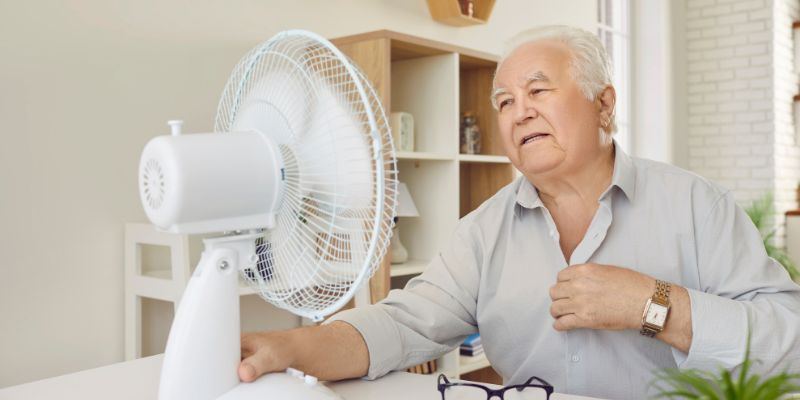As Connecticut and the nation endure an intense heat wave, it's crucial to recognize the heightened risks that extreme temperatures pose to our senior population. Older adults are particularly vulnerable to heat-related illnesses, such as heat exhaustion and heat stroke, which can be life-threatening if not promptly addressed. Understanding why seniors are more at risk, recognizing the warning signs, and knowing the necessary precautions can make a significant difference in safeguarding their health during these scorching summer months.
Why Are Seniors More at Risk? Several factors contribute to the increased vulnerability of seniors to heat-related illnesses:
Decreased Ability to Regulate Temperature: As we age, our bodies become less efficient at regulating temperature. This means seniors may not sweat as effectively or feel as thirsty, making it harder to cool down and stay hydrated.
Chronic Health Conditions: Many older adults have chronic health conditions, such as heart disease, diabetes, and respiratory issues, which can exacerbate the effects of extreme heat.
Medications: Certain medications, including those for high blood pressure, heart disease, and depression, can impair the body's ability to regulate temperature or stay hydrated.
Reduced Mobility & Social Isolation: Older adults living alone may not have immediate assistance or be aware of heat advisories and then fail to take necessary precautions Those with limited mobility may find it challenging to move to cooler environments or access hydration easily. TIP: Always check on your neighbors!
Increased Risk of Heat-Related Death
Statistics indicate that seniors are more likely to suffer severe consequences from heat-related illnesses compared to younger individuals. According to the Centers for Disease Control and Prevention (CDC), adults aged 65 and older are more prone to heat stress and have higher hospitalization and mortality rates during heat waves. This heightened risk underscores the need for vigilant monitoring and proactive measures to protect our senior population.
Warning Signs of Heat Exhaustion and Heat Stroke
Recognizing the symptoms of heat exhaustion and heat stroke in seniors is vital for timely intervention:
Heat Exhaustion:
Heavy sweating
Weakness or fatigue
Dizziness or fainting
Nausea or vomiting
Muscle cramps
Headache
Cool, moist skin
Heat Stroke:
High body temperature (103°F or higher)
Hot, red, dry, or damp skin
Rapid, strong pulse
Confusion or altered mental state
Slurred speech
Seizures
Loss of consciousness
Precautions to Prevent Heat-Related Illness
To protect seniors from the dangers of extreme heat, the following precautions should be taken. As noted above, those who live alone or are socially isolated are at a higher risk and often will not have access or the ability to take these precautions. If you know someone in an at risk situation, please contact family members or even social services to ensure their safety.
Stay Hydrated: Encourage regular fluid intake, even if they don't feel thirsty. Water is best, but sports drinks can help replace electrolytes lost through sweating.
Seek Cooler Environments: Ensure access to air-conditioned spaces. If air conditioning is not available at home, visit public places like libraries, shopping malls, or community centers. Many towns and cities open “cooling centers” during extreme heat events. Check with your local authorities for availability.
Limit Outdoor Activities: Avoid strenuous activities and stay indoors during the hottest parts of the day, typically between 10 a.m. and 4 p.m.
Dress Appropriately: Wear lightweight, loose-fitting clothing and wide-brimmed hats to stay cool.
Use Cooling Devices: Fans, cool showers, and damp washcloths can help lower body temperature.
Monitor Weather Reports: Stay informed about heat advisories and take necessary precautions on extremely hot days.
What to Do If You Experience Symptoms
If you or someone you know exhibits symptoms of heat exhaustion or heat stroke, take immediate action:
For Heat Exhaustion:
Move to a cooler, air-conditioned place.
Drink water or a sports drink.
Take a cool shower or use cold compresses.
Rest and avoid strenuous activity.
For Heat Stroke:
Call 911 immediately—heat stroke is a medical emergency.
Move the person to a cooler place.
Help lower their body temperature with cool cloths or a cool bath.
Do not give them anything to drink.
Noble Horizons is committed to senior Well-being
At Noble Horizons, we prioritize the health and safety of our residents, especially during extreme weather conditions. Our team is dedicated to providing a comfortable, safe environment with access to air-conditioned spaces and regular hydration. We encourage all caregivers and family members to remain vigilant and proactive in ensuring the well-being of their loved ones during this heat wave.
While the heat wave presents significant risks, awareness and proactive measures can help protect our senior population. By understanding the unique vulnerabilities of older adults and taking appropriate precautions, we can ensure that they stay safe, healthy, and comfortable during these challenging times.
**This should not be construed as medical advise. Please contact your health care provider if you have questions or concerns. As noted, dial 911 if you suspect heat stroke.

